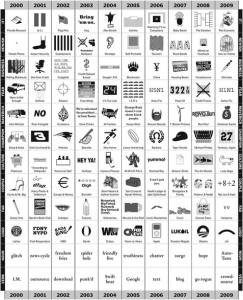A nice graphic published by the New York Times showing change over the last 10 years.
Tag: history
Auto-Tune and the trajectory of fads
This intelligently done history of Auto-Tune is wonderful for several reasons. First, it has a simple, elegantly executed story arc, where it describes the trajectory of a fad from introduction to over-exposure to parody/remix and finally to a new equilibrium. And it discusses these concepts in a clear and entertaining way.
Know Your Meme: Auto Tune (featuring “Weird Al” Yankovic) from Rocketboom on Vimeo.
Second, Auto-Tune is a great example of something that was created for one purpose but finds a new life in a completely different discipline. The technology was created for analyzing seismic signals in petroleum exploration before being applied to music. It is amazing what can come from working with people of diverse backgrounds, and having a broad appreciation of the world. Group work is important.
Third, in touching on parody, it brings up an issue that adolescents, in particular need to understand; parody is not just a cheap joke, it has something important to say. It uses humor to address significant issues:
While making fun of something is easy [mockery], parody requires a study of both technique and form, before creating its own recontextualization.
Third, the overexposure stage of fads and memes is something everyone should be aware of. The meme infiltrates so many aspects of the culture that it becomes irritating. As a Middle School teacher I see it primarily in the language my students use. By introducing this concept to my student, we now have a common language for talking about at least one type issues in the classroom.
Finally, equilibrium. An important concept in natural and social science, the concept is neatly encapsulated in how the fad starts off small, overshoots and gets smaller but does not disappear as there remains some lower level of use.
Silk
How to make silk using the traditional method, by the American Museum of Natural History.
I’ve loved Barry Hughart’s novel, “Bridge of Brids” from the first time I read it a number of years ago. It is the story of a peasant boy, Number Ten Ox, who, with the assistance of the drunken sage Master Li, has to save the children of his village by unraveling the mystery of the powerful Duke of Chin. Not only is it beautifully written, with a poetic story arc and engaging characters, but it also has a wonderful description of initial stages of the silk making process, even though the book describes itself as, “A novel of an ancient China that never was.” The descriptions of Chinese traditions are accurate and detailed enough that you learn a lot about the country. Pulling apart what is historically accurate and what is fiction makes and interesting challenge but is not too difficult.
Spider silk from Madagascar.
Food fight
Although we eschew warfare as a means resolving differences, this video, which “is an abridged history of American-centric war, from World War II to present day, told through the foods of the countries in conflict”, provides a fascinating perspective on the world. It comes from the Food Fight website.
The key to the different food characters will probably be useful for those less familiar with American history. Watching it without the key might also be useful if you’re interested in discussing metaphors, which should become extremely obvious when you get to the World Trade Centers.
I’m really curious too see how the mini-demographic groups respond to this video. I can predict that some of the more video game (FPS) infatuated students will love this. But how will my more food oriented students react?
Free documentaries online
The website http://www.freedocumentaries.org/ has a large number of political documentaries available for free download. Although they seem to be mostly from the perspective of the left (and some seem to come from quite far to the left), there are a number of interesting titles dealing with human rights and the media. A few titles pop out (that I’ve heard are good but have not yet seen myself):
- Control Room: A look at the Iraq War from the perspective of Al Jazeera that stirred a lot of controversy and won a number of film awards.
- The Story of God (three parts): Three part series on the history of religious ideas by the BBC.
- Auschwitz: A detailed six part documentary on Auschwitz.
- The Fog of War: Features a recent interview with Robert McNamara, one of the architects (Sec. Defence) of the Vietnam War.
You can also find more free documentaries at:
- http://www.snagfilms.com/films
- http://www.nfb.ca/
- http://www.pbs.org/wgbh/pages/frontline/
- http://topdocumentaryfilms.com/
- http://www.avgeeks.com/ – for some somewhat dated classics
